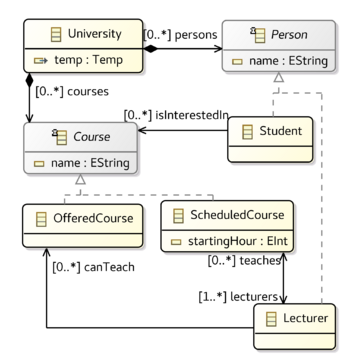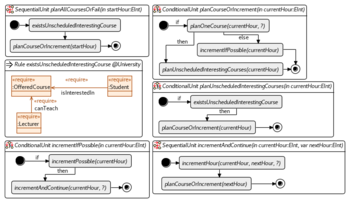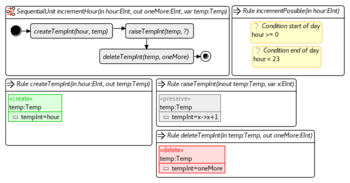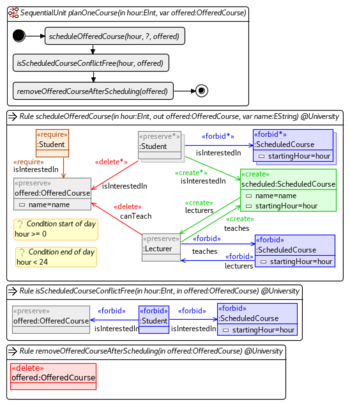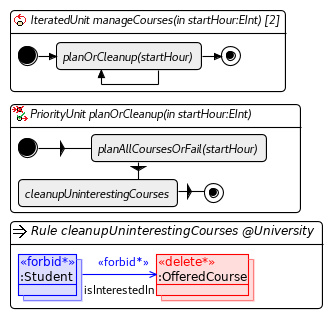Notice: This Wiki is now read only and edits are no longer possible. Please see: https://gitlab.eclipse.org/eclipsefdn/helpdesk/-/wikis/Wiki-shutdown-plan for the plan.
Henshin/Examples/University Courses
The purpose of Henshin's University Courses example is to assign university courses to lecturers and students while avoiding time conflicts. It is also meant to be an accessible example for the usage of Units. This example wants to showcase as many units as possible. Therefore please pardon that some units' usage may seem unnecessarily complicated. The transformation model, example input models and source code can be found here.
Metamodel
The metamodel describes a University which contains Courses and Persons.. A Course has a name, belongs to a university and can be of two types. An OfferedCourse represents a course which can be staged in the next lecture period. A ScheduledCourse represents a course which is staged in the next lecture period with the hour it is starting. For the sake of simplicity, we consider one generic weekday only, moreover, every course duration is one hour. Furthermore it is required to have at least one lecturer. A Lecturer is a person who can teach offered courses and teaches scheduled courses. A Student is a person who is interested in courses. The Temp object contained in a university is defined to save transient information of course scheduling. The metamodel is defined in the file universityCourses.ecore.
Instance Model Restrictions
Instance models - which should be transformed with the transformation rules below - have to meet the following requirements:
- The instance model should contain at least a University object.
- The name of a Course is considered to be unique. There must not be any pair of OfferedCourse/ScheduledCourse objects which share the same name.
- There must not be any time conflicts for a Lecturer or Student and their associated ScheduledCourses.
Henshin Rules and Units
The SequentialUnit planAllCoursesOrFail (strict=true, rollback=false) executes the rule existsUnscheduledInterestingCourse first. The rule existsUnscheduledInterestingCourse checks the existence of an OfferedCourse having an interested Student as well as a Lecturer capable of teaching the Course. If this application is successful, planCourseOrIncrement is executed.
The ConditionalUnit planCourseOrIncrement tries to apply the sub-unit planOneCourse. If it is successfully applicable, planCourseOrIncrement basically calls itself recursively to attempt planOneCourse again by calling the ConditionalUnit planUnscheduledInterestingCourses. This unit uses existsUnscheduledInterestingCourse so that the application terminates as soon as all interesting courses are scheduled. In contrast to the very similar (strict) SequentialUnit planAllCoursesOrFail, this ConditionalUnit does not fail if no unscheduled courses exist. If it failed after all courses have been scheduled, the previous execution of planCourseOrIncrement would also be unsuccessful and would lead to the rescission of the last planOneCourse execution. In consequence there would always remain one unscheduled but interesting course after the successful application of planAllCoursesOrFail. Therefore the ConditionalUnit planUnscheduledInterestingCourses - which never fails after an unsuccessful application of its if-sub-unit - is used inside planCourseOrIncrement.
If planOneCourse is not applicable, the ConditionalUnit incrementIfPossible first checks whether incrementing the current hour is possible by applying the rule incrementPossible. After a successful application of incrementPossible the SequentialUnit incrementHour is applied in the SequentialUnit incrementAndContinue. The unit incrementHour raises the passed-in hour parameter by one and returns the result via the parameter oneMore. After successfully incrementing the hour value planCourseOrIncrement is called again. In the end planCourseOrIncrement should only terminate with the maximum number of courses (with prospective students) scheduled between the starting time and the end of the day.
planOneCourse is a SequentialUnit with the flags strict=true and rollback=true. First, it schedules a course which prevents time conflicts for lecturers by fixing the time using the rule scheduleOfferedCourse. Furthermore it attempts to associate all interested students without time conflicts with the scheduled course. Afterwards planOneCourse checks the absence of interested students with time conflicts by applying the rule isScheduledCourseConflictFree. At last, the according OfferedCourse is removed by an application of removeOfferedCourseAfterScheduling. This unit may fail in scheduleOfferedCourse if there is no lecturer associable without time conflict or in isScheduledCourseConflictFree if there is an interested student with time conflict. Due to the flag strict=true, the SequentialUnit application stopps at the failed rule and due to the flag rollback=true it reverts all applied transformations. This means that planOneCourse is applied only if there is no time conflict for students or lecturers.
The rule scheduleOfferedCourse tries to find an OfferedCourse in which at least one Student is interested in and which can be taught by at least one Lecturer. The in-parameter hour defines the hour to which the course can be scheduled. The Lecturer must not teach another ScheduledCourse at the same time (here called startingHour). If those requirements are met, a new ScheduledCourse with the same name as the OfferedCourse is created at the given time. At the same time the rule attempts to move students to the ScheduledCourse. If a Student is not interested in another conflicting ScheduledCourse he/she will get associated with the ScheduledCourse instead of the OfferedCourse.
The rule isScheduledCourseConflictFree checks whether there is no student interested in an OfferedCourse with corresponding ScheduledCourse and who is interested in a ScheduledCourse at the same time. This rule basically detects Students who cannot be treated by moveStudentsToScheduledCourse. The rule removeOfferedCourseAfterScheduling (checkDangling=false) deletes an OfferedCourse that is scheduled.
The starting point for the application of this example is the IteratedUnit manageCourses with the flag strict set to false. The in-parameter startHour in this and all other units sets the earliest hour to which courses can be scheduled. This unit tries to apply its sub-unit planOrCleanup two times which shall ensure that each of the two sub-units of planOrCleanup is applied at least once. planOrCleanup is a PriorityUnit with the sub-units planAllCoursesOrFail and cleanupUninterestingCourses. The former sub-unit can be applied successfully at most once. This means that the rule cleanupUninterestingCourses which removes OfferedCourses without prospective students (checkDangling=false) is applied in the second iteration at latest.
Loop Unit vs. Nested Rule
The rule cleanupUninterestingCourses, which is realised using a nested rule, can alternatively be replaced by a LoopUnit cleanupUninterestingCoursesUnit. This unit contains the multi-rule of the formerly nested rule and is named cleanupUninterestingCourse here (singular!). The expression with a nested rule is preferreable in this case because of its greater simplicity. But for a unit (instead of a rule) which has to be executed as many times as possible a LoopUnit has to be used necessarily.
contributed by Benjamin Heidelmeier and Gabriele Taentzer
PLEASE NOTE: This example does not work reliably with the Henshin 1.4 release. Try a newer release or the current nightly build.

